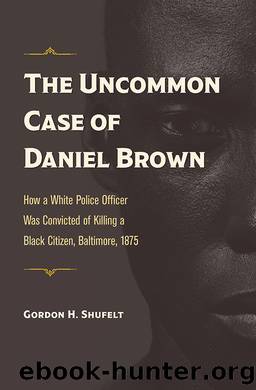The Uncommon Case of Daniel Brown by Shufelt Gordon H.;

Author:Shufelt, Gordon H.;
Language: eng
Format: epub
Publisher: The Kent State University Press
CHAPTER 6
The Police on Trial
The Baltimore City Criminal Court scheduled the trial of Patrick McDonald for November 1875. As it turned out, police violence and the problem of police interference in elections was very much in the public eye as the trial date approached. Elections in the autumn of 1875 were especially disorderly, and mistrust of the police force was more intense than ever. As Officer McDonaldâs trial proceeded, the entire police force was, in effect, on trial.
In the autumn of 1875, the Democratic Partyâs grip on power began to loosen, resulting in intensely fought election campaigns at both the city and state levels. After an acrimonious session at the Democratsâ state convention, a faction broke from party regulars and joined a reform movement of independents and Republicans. Party regulars, who identified themselves as conservative Democrats, mocked the breakaway faction as âpotato bugs,â but with a strong field of candidates and fusion with the Republicans, the reformers presented a serious, if ultimately unsuccessful, challenge to the majority party. And as had happened in periods of heightened political activity in the preceding two decades, the campaigns of October and November 1875 brought unwanted attention to the police. The accounts of police misconduct in these election campaigns set the stage for the murder trial of Officer McDonald, which was scheduled to begin in mid-November.
Although discontent with regular Democrats had been growing in the early 1870s, the sudden surge in the fortunes of the reform movement came as a surprise to most observers. Republicans and reformers grumbled about the strength of Democrat ward bosses as early as 1871 after Joshua Vansant won the mayoralty race. Vansant, they argued, represented the growing influence of âmachineâ politics.1 To most observers in early 1875, however, antimachine sentiment did not pose a viable threat to Democratic dominance. Even as the cityâs major parties prepared for the upcoming political season, advocates for reform believed they had little chance to unseat regular Democrats in the upcoming municipal and state elections. In June, when the Democratic city convention nominated Ferdinand C. Latrobe as its candidate for mayor, editors of the Republican-leaning Baltimore American lamented that Latrobe would not have much opposition. An American editorial conceded that the Democratsâ nominee was âin all probabilityâ the next mayor.2
When state Democrats convened on July 22, 1875, however, a bitter struggle over the nomination of a candidate for governor brought an abrupt shift in the political landscape at both the state and city levels. Led by Arthur P. Gorman and I. Freeman Rasin, party regulars forced through the nomination of John Lee Carroll for governor after an acrimonious struggle with supporters of William T. Hamilton. Many Democrats resented the tactics of Gorman and Rasin, and dissidents recognized that the simmering resentment gave rise to an opportunity for opponents of the party regulars. The defeated supporters of Hamilton, identifying themselves as independent Democrats, immediately began organizing an opposition movement. In secret meetings from late July to the middle of August, they established alliances among disaffected Democrats, independent reformers, and Republicans.
Download
This site does not store any files on its server. We only index and link to content provided by other sites. Please contact the content providers to delete copyright contents if any and email us, we'll remove relevant links or contents immediately.
| Africa | Americas |
| Arctic & Antarctica | Asia |
| Australia & Oceania | Europe |
| Middle East | Russia |
| United States | World |
| Ancient Civilizations | Military |
| Historical Study & Educational Resources |
The Dawn of Everything by David Graeber & David Wengrow(1590)
The Bomber Mafia by Malcolm Gladwell(1546)
Facing the Mountain by Daniel James Brown(1457)
Submerged Prehistory by Benjamin Jonathan; & Clive Bonsall & Catriona Pickard & Anders Fischer(1386)
Tip Top by Bill James(1317)
Wandering in Strange Lands by Morgan Jerkins(1295)
Evil Geniuses: The Unmaking of America: A Recent History by Kurt Andersen(1285)
Red Roulette : An Insider's Story of Wealth, Power, Corruption, and Vengeance in Today's China (9781982156176) by Shum Desmond(1276)
The Way of Fire and Ice: The Living Tradition of Norse Paganism by Ryan Smith(1269)
Driving While Brown: Sheriff Joe Arpaio Versus the Latino Resistance by Terry Greene Sterling & Jude Joffe-Block(1247)
American Kompromat by Craig Unger(1225)
It Was All a Lie by Stuart Stevens;(1211)
F*cking History by The Captain(1208)
American Dreams by Unknown(1177)
Treasure Islands: Tax Havens and the Men who Stole the World by Nicholas Shaxson(1173)
Evil Geniuses by Kurt Andersen(1165)
White House Inc. by Dan Alexander(1136)
The First Conspiracy by Brad Meltzer & Josh Mensch(1093)
The Fifteen Biggest Lies about the Economy: And Everything Else the Right Doesn't Want You to Know about Taxes, Jobs, and Corporate America by Joshua Holland(1043)
